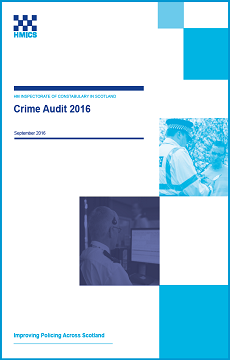The aim of our audit was to assess the state, efficiency and effectiveness of crime recording by Police Scotland and the extent to which practice complies with the Scottish Crime Recording Standard and Counting Rules. We also assessed arrangements for the management, governance and internal auditing of crime recording. This audit follows similar audits of crime recording carried out by HMICS in 2013 and 2014.
The results of our Crime Audit 2016 will provide the public and key stakeholders with up-to-date information on which to base their assessment of the accuracy of crime statistics and will highlight to Police Scotland areas of good practice as well as areas for improvement. Through our audit, we also sought to assess the extent to which previous recommendations regarding crime recording have been implemented by Police Scotland and the Scottish Police Authority. Our audit also seeks to address the need for comprehensive, independent audits of crime data as highlighted by the UK Statistics Authority.
We tested the accuracy of crime recording by auditing incident and crime records. We examined over 6,000 incidents and 5,000 crimes. We examined records in five categories: sexual crime; violence; damage; non-crime related incidents; and no-crimes.
Number | Recommendation |
|---|---|
1 | Police Scotland should develop guidance for all officers and staff involved in crime recording decisions which highlights all recurring errors identified in our audits and notes the correct recording practice. |
2 | Police Scotland should embed a ‘record-to-investigate’ approach to all crime recording in support of a victim-centred service. In relation to sexual crime, Police Scotland should ensure that, where there is sufficient information to create a crime record, the crime record is not delayed by awaiting the statement obtained from the victim by the Sexual Offences Liaison Officer. |
3 | Police Scotland should ensure that officers update incident and crime recording systems with sufficient information regarding the status and outcome of investigations to ensure compliance with the Scottish Crime Recording Standard. Such information should not only be held on the Interim Vulnerable Person’s Database. |
4 | Police Scotland should develop the ability to tag all incidents and crimes with a marker to show that they have a cyber element and to assess the nature and scale of cyber-crime and its demands on policing in Scotland. |
5 | The Scottish Crime Recording Board should consider the extent to which current crime recording practice adequately captures the scale of cyber-enabled sexual crime and associated victimisation, particularly for children and young people. |
6 | Police Scotland should work with Action Fraud to clarify its role in Scotland, and clear and accurate information should be disseminated to the public. |
7 | In developing its customer contact strategy, Police Scotland should set out what standards of service the public should expect to receive, an attendance policy, guidance on re-contacting complainers, and guidance on the circumstances in which it is appropriate to make diary appointments. |
8 | Police Scotland should review the role and resourcing of the Quality Assurance Unit serving Edinburgh and Lothian and Scottish Borders Divisions with a view to ensuring that crime records are created timeously and accurately. Any unnecessary duplication in assurance processes should be avoided. |
9 | Police Scotland should develop a strategy to support its implementation of the Scottish Crime Recording Standard. |
10 | Police Scotland should promote a ‘right first time’ approach to SCRS compliance throughout the service. Police Scotland should also consider what measures, such as improved training, will be necessary to support such an approach. |
11 | Police Scotland should streamline incident scrutiny processes carried out by the Contact, Command and Control Division and local policing divisions to minimise unnecessary duplication. |
12 | In developing the Contact, Command and Control quality assurance framework, Police Scotland should ensure that calls made to the police and the resulting incidents are checked for SCRS compliance. |
13 | Police Scotland should assess what scrutiny and/or audit arrangements should be developed in respect of reports of crime made via alternative routes, such as referrals from partner agencies. |
14 | To support its crime recording strategy, Police Scotland should review the national and regional crime registrar roles and review whether the current resourcing arrangements are sufficient. In particular, Police Scotland should ensure that there is sufficient capacity to undertake all aspects of the registrar role as well as the required audits, and that the crime registrar role in the West is sufficiently resourced. |
15 | Police Scotland should develop a training plan to support the delivery of its crime recording strategy. |


